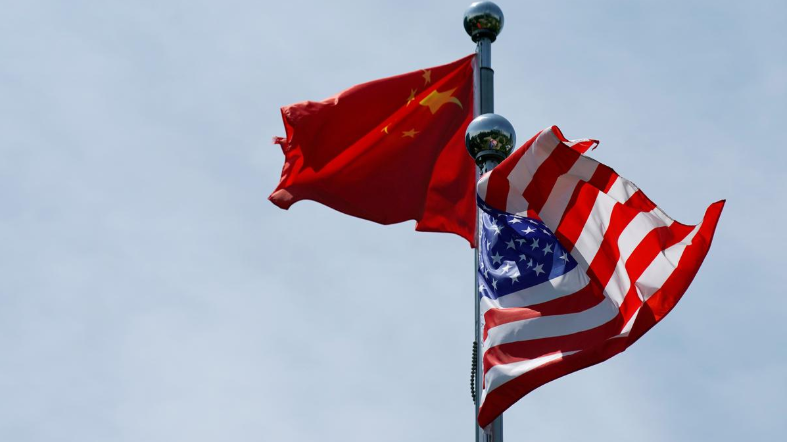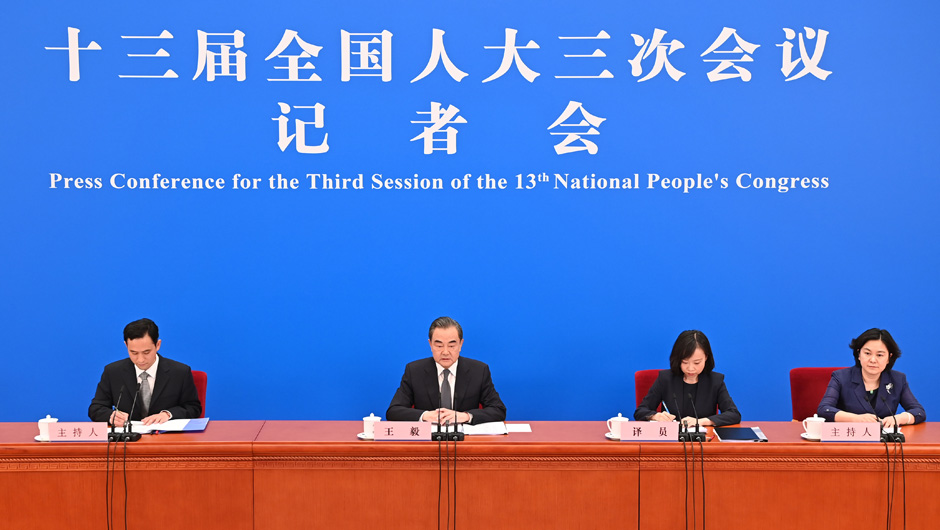
Editor's note: Tom Fowdy is a British political and international relations analyst and a graduate of Durham and Oxford universities. He writes on topics pertaining to China, the DPRK, Britain and the U.S. The article reflects the author's opinions, and not necessarily the views of CGTN.
On May 24, China's Foreign Minister Wang Yi held a press conference where he spoke on a number of international issues. Most prominently, this included a focus on Beijing's relationship with the United States, the World Health Organization and the impact of COVID-19. In doing so, Wang condemned what he described as a "political virus" in the United States "jumping at any opportunity to attack and slander China" and the use of "countless lies and conspiracy theories".
However, despite making these points, the Foreign Minister proceeded to urge bilateral cooperation between the United States and China as the best way forwards for both countries, stating: "China and the U.S. have different social systems, but this is the result of the different choices made by our people, which we must respect. It's also true that we have many disagreements, but that doesn't preclude cooperation."
In doing so, he immediately sought to play down claims that China was now engaged in a struggle for global hegemony with America, outlining that Beijing "has no intention to change, still less replace, the U.S. It's time for the U.S. to give up its wishful thinking of changing China or stopping the 1.4 billion Chinese people's historical march toward modernization," and in turn described the talk of a "new Cold War" aggressively pushed by Washington politicians as "dangerous".
These comments are both sobering and clarifying. They are urgently needed to be heard by a growing audience in the United States and similar countries who have been convinced that China is hell bent on quest to world domination, that the foreign policies of the Trump administration targeting Beijing are within merit and efforts of "engagement" concerning the country are a failure. This is not the reality. Pragmatic and stable cooperation between the United States and China remain critical for the well-being of both countries. Geopolitical confrontation is bad for the entire world.

Chinese Foreign Minister Wang Yi (2nd L) at the press conference, May 24, 2020. /Xinhua
Chinese Foreign Minister Wang Yi (2nd L) at the press conference, May 24, 2020. /Xinhua
The White House's new "China strategy" illustrates the frame of mind dominant in Washington concerning Beijing. In its opening paragraph, the document premises that engagement with China was conditional on the premise that the country would transform itself through opening up into the political vision which America sought for it. In other words, it is contingent upon ideological and political transformation to fit U.S. preferences. The document proceeds to outline that because that didn't prove to be the cause, America's strategy towards China ought to be more assertive and built on "force" – rendering the idea that engagement or positive ties with Beijing was a failure.
As a result, the Trump administration has derided cooperation and pursued zero-sum confrontation with Beijing in the fields of trade, technology and investment. In turn it has also attempted to force other countries to "choose" between the U.S and China, or used aggressive unilateral methods to impose these positions on others. In doing so, it is argued that this better suits America's interests. The mainstream media has largely played along to this discourse and followed suit in depicting China as a threat to be confronted. COVID-19 has now accelerated such moves, with the White House pushing belligerent measures largely considered to be pursuing "decoupling" in the search of ending economic and technology ties between the two powers.
Wang Yi's press conference today highlights that this mentality is mistaken: the world does not in fact stand to gain from U.S.-China confrontation, and nor does the United States itself. This politics of a "new Cold War" in fact is to the detriment of all by severing global cooperation on key issues, damaging the global economy and fermenting instability in the international system. The world's two largest economies in a state of confrontation will set the world backwards economically, financially and technologically. Given this, whilst China otherwise has no choice to defend its interests, it is an important clarification from Wang that this is really not the path Beijing wants to pursue: thus it is vital that cooperation and pragmatic ties remain the bedrock of U.S.-China relations in turn. The claim that China seeks to overturn the global order and build its own is a nonsensical claim which is not supported with evidence. The persistent interpretation of every action from China as a zero-sum competition with the U.S is misleading, and thus ignores the premise that stability remains at the heart of its foreign policy.
In this case, while there might be little that China can do to curve the relentless hostility coming their way from Washington, this conference serves to send a message that cooperation still remain the underlying goal. Washington must in turn be more realistic rather than believing it has a right to "change" China and prepare to compromise than pushing an ever-growing list of demands on Beijing. Ultimately, in the long run the current trajectory will not serve the greater national or global good. Stability in China-U.S. ties must remain ultimately paramount.
(If you want to contribute and have specific expertise, please contact us at opinions@cgtn.com.)